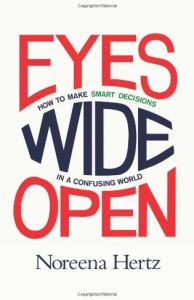Join getAbstract to access the summary!

Join getAbstract to access the summary!
Noreena Hertz
Eyes Wide Open
How to Make Smart Decisions in a Confusing World
HarperBusiness, 2013
What's inside?
Good lives depend on good decisions, and bad decisions can lead to living a bad life.
Recommendation
Good lives depend on good decisions; bad decisions can send lives on a downturn. University College London professor Noreena Hertz is here to help you make better decisions. She provides solid information about the decision-making process, buttressed with practical advice about making informed choices. Hertz supplies fascinating examples from science about how people make decisions and provides colorful anecdotes about their choices. Her tutorial is easy to understand and also fun to read. Each chapter is jam-packed with numerous great tips on how to decide when you must. Since everyone has to make choices and wants to do it well, getAbstract finds that buying Hertz’s book is a good decision.
Summary
About the Author
Noreena Hertz, Professor at the Centre for the Study of Decision-Making at University College London, is a leading expert on strategy, data and decision-making.
















Comment on this summary
Think of a recipe that only lists the ingredients and gives no clue on what to do with them to cook up that delicious delight. Here we are presented with some things to think about, and some nice examples, but nothing really to suggest a process for good decision making.